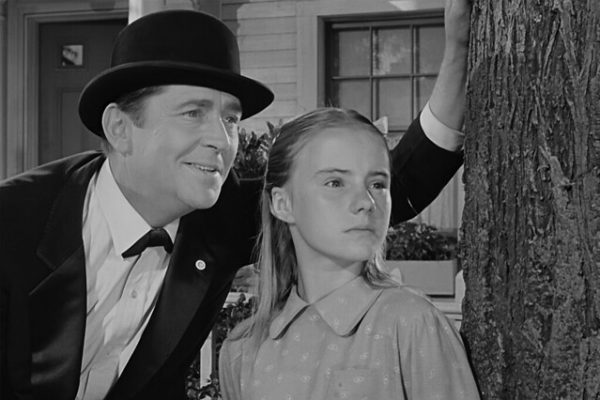Available on Blu-ray Mon 22 Jul 2019.
“Times are hard for dreamers,” Audrey Tautou‘s Amelie is told in the film of the same name, and Elia Kazan’s debut A Tree Grows in Brooklyn demonstrates it has ever been thus. This sentimental melodrama is presented through the eyes of thirteen-year-old Francie (Peggy Ann Garner) in the early years of the 20th Century. She’s torn between adoration for her endearing but irresponsible father and a growing realisation just how much pressure is on her harder, sterner mother to keep the family afloat. There’s a spine of steel through the film, an edge of darker realism that gives it a timeless quality, as well as a quiet but insistent emotional force.
The Nolans live in a tenement block in Williamsburg, Brooklyn. The sense of community is strong but poverty exerts an unyielding grip. Francie is academically bright, with aspirations of being a writer. This dream is encouraged by her father Johnny (James Dunn), even though his own alcoholism and general unreliability put this in jeopardy. Mother Katie (Dorothy McGuire) scrubs the tenement and sells scraps of fabric to keep the family barely afloat. She also disapproves of her ebullient sister Sissy (Joan Blondell), now on her third husband and who she feels tarnishes the family’s reputation. The film strips the sixteen-year span of Betty Smith‘s source novel to a single year – one full in hardship and tragedy, but rich in hope and love.
The focus on Francie lets the audience find empathy in the extremes of her parents. Both have one particular aspect of their personality emphasised in dramatic shorthand, but Kazan’s direction keeps things balanced. Optimism is important, and Johnny is admirable in wanting Francie to be able to cling on to a childhood that her hardscrabble life wants to wrench from her. Katie (McGuire is superb and vanity-free in an initially thankless shrewish role) is forced into the role of the bad guy in the eyes of her children, and it’s Francie’s gradual appreciation of her mother that elegantly establishes the film’s coming-of-age narrative.
Ultimately, one concludes that A Tree Grows in Brooklyn comes down on the side of pragmatism, which is something of a departure from the Hollywood assembly line but is in keeping with the need to take stock and count costs as World War II wound down. One can also correlate this approach with Kazan’s decision to testify against some of his peers to the House Un-American Activites Committee a decade later. This cooperation with McCarthyism may have saved his career in the short term, but his reputation never fully recovered.
Regardless of any subsequent taint, this is a remarkable debut, despite a slightly indulgent length. He coaxes tremendous performances from his cast. They feel believable as a family, and this is the key to the film’s success. It’s melodrama and sentiment without mawkishness; up there with the best of the era like Frank Capra and Douglas Sirk.
